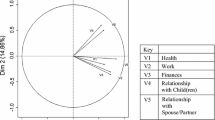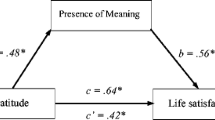Abstract
Gratitude is a positive psychological characteristic that is connected to well-being. The aim of this study is to examine the effects of both social support and self-esteem in the association between gratitude and life satisfaction among undergraduate students. Four hundred and twenty-seven Chinese undergraduate participants were asked to complete the Gratitude Questionnaire, the Rosenberg Self-esteem Scale, the Multi-Dimensional Scale of Perceived Social Support and the Satisfaction with Life Scale. Path analysis indicated that social support acted as a full mediator of the association between gratitude and life satisfaction. The identified model also revealed a significant path from gratitude through social support and self-esteem to life satisfaction. Furthermore, a multi-group analysis indicated that males with high gratitude scores are more likely to get greater social support than females, while females with high social support scores tended to report greater life satisfaction than males. The present findings provide valuable guidance for how to implement psychological interventions aimed at enhancing undergraduates’ well-being.

Similar content being viewed by others
References
Akaike, H. (1987). Factor analysis and AIC. Psychometrika, 52, 317–332.
Anderson, J. C., & Gerbing, D. W. (1988). Structural equation modeling in practice: A review and recommended two-step approach. Psychological Bulletin, 103, 411–423.
Arbuckle, J. L. (2003). AMOS 5.0 update to the AMOS user’s guide. Chicago, IL: Smallwaters.
Browne, M. W., & Cudeck, R. (1993). Alternative ways of assessing model fit. Newbury Park, CA: Sage.
Byrne, B. (2001). Structural equation modeling with amos: Basic concepts, applications and programming. New Jersey: Lawrence Erlbaum Associates.
Chen, L. H. (2013). Gratitude and adolescent athletes’ well-being: The multiple mediating roles of perceived social support from coaches and teammates. Social Indicators Research, 114, 273–285.
Chen, L. H., Chen, M. Y., & Tsai, Y. M. (2012). Does gratitude always work? Ambivalence over emotional expression inhibits the beneficial effect of gratitude on well-being. International Journal of Psychology, 47, 381–392.
Chen, L. H., & Kee, Y. H. (2008). Gratitude and adolescent athletes well-being. Social Indicators Research, 89, 361–373.
Cheng, S. T., & Chan, A. (2006). Social support and self-rated health revisited: Is there a gender difference in later life? Social Science and Medicine, 63, 118–122.
Diener, E., Emmons, R. A., Larsen, R. J., & Griffin, S. (1985). The satisfaction with life scale. Journal of Personality Assessment, 49, 71–75.
Diener, E., Oishi, S., & Lucas, R. E. (2003). Personality, culture, and subjective well-being: Emotional and cognitive evaluations of life. Annual Review of Psychology, 54, 403–425.
Dunn, J. C., Whelton, W. J., & Sharpe, D. (2006). Maladaptive perfectionism, hassles, coping, and psychological distress in university professors. Journal of Counseling Psychology, 53, 511–523.
Emmons, R. A., & McCullough, M. E. (2003). Counting blessings versus burdens: An experimental investigation of gratitude and subjective well-being in daily life. Journal of Personality and Social Psychology, 84, 377–389.
Emmons, R. A., & Shelton, C. M. (2002). Gratitude and the science of positive psychology. In C. R. Snyder & S. J. Lopez (Eds.), Handbook of positive psychology (pp. 459–471). Oxford: Oxford University Press.
Fredrickson, B. L. (2001). The role of positive emotions in positive psychology: The broaden-and-build theory of positive emotions. American Psychologist, 56, 218–226.
Fredrickson, B. L. (2004). Gratitude, like other positive emotions, broadens and builds. In R. A. Emmons & M. E. McCullough (Eds.), The psychology of gratitude (pp. 145–166). New York: Oxford University Press.
Froh, J. J., Sefick, W. J., & Emmons, R. A. (2008). Counting blessings in early adolescents: An experimental study of gratitude and subjective well-being. Journal of School Psychology, 46, 213–233.
Froh, J. J., Yurkewicz, C., & Kashdan, T. B. (2009). Gratitude and subjective well-being in early adolescence: Examining gender differences. Journal of Adolescence, 32, 633–650.
Hermans, H. J. M. (1992). Unhappy self-esteem: A meaningful exception to the rule. Journal of Psychology, 126, 555–570.
Hoffman, M. A., Ushpiz, V., & Levy-Shiff, R. (1988). Social support and self-esteem in adolescence. Journal of Youth and Adolescence, 17, 307–316.
Hu, L. T., & Bentler, P. M. (1999). Cutoff criteria for fit indexes in covariance structure analysis: Conventional criteria versus new alternatives. Structural Equation Modeling, 6, 1–55.
Jöreskog, K. G., & Sorbom, D. (1989). LISREL 7: A guide to the program and applications. Chicago: SPSS.
Kashdan, T. B., Mishra, A., Breen, W. E., & Froh, J. J. (2009). Gender differences in gratitude: Examining appraisals, narratives, the willingness to express emotions, and changes in psychological needs. Journal of Personality, 77, 691–730.
Kashdan, T. B., Uswatte, G., & Julian, T. (2006). Gratitude and hedonic and eudaemonic well-being in Vietnam war veterans. Behaviour Research and Therapy, 44, 177–199.
Kong, F., Wang, X., & Zhao, J. (2014). Dispositional mindfulness and life satisfaction: The role of core self-evaluations. Personality and Individual Differences, 56, 165–169.
Kong, F., & You, X. (2013). Loneliness and self-esteem as mediators between social support and life satisfaction in late adolescence. Social Indicators Research, 110, 271–279.
Kong, F., & Zhao, J. (2013). Affective mediators of the relationship between trait emotional intelligence and life satisfaction in young adults. Personality and Individual Differences, 54, 197–201.
Kong, F., Zhao, J., & You, X. (2012a). Social support mediates the influence of emotional intelligence on mental distress and life satisfaction in Chinese young adults. Personality and Individual Differences, 53, 513–517.
Kong, F., Zhao, J., & You, X. (2012b). Emotional intelligence and life satisfaction in Chinese university students: The mediating role of self-esteem and social support. Personality and Individual Differences, 53, 1039–1043.
Lefkowitz, E. S., & Zeldow, P. B. (2006). Masculinity and femininity predict optimal mental health: A belated test of the androgyny hypothesis. Journal of Personality Assessment, 87, 95–101.
Levant, R. F., & Kopecky, G. (1995). Masculinity, reconstructed. New York: Dutton.
Li, D., Zhang, W., Li, X., Li, N., & Ye, B. (2012). Gratitude and suicidal ideation and suicide attempts among Chinese Adolescents: Direct, mediated, and moderated effects. Journal of adolescence, 35, 55–66.
Little, T. D., Cunningham, W. A., Shahar, G., & Widaman, K. F. (2002). To parcel or not to parcel: Exploring the question, weighing the merits. Structural Equation Modeling: A Multidisciplinary Journal, 9, 151–173.
Mack, J. E. (1983). Self-esteem and its development: An overview. In J. E. Mack & S. L. Ablon (Eds.), The development and sustenance of self-esteem in childhood (pp. 1–42). New York: International Universities Press.
Maxwell, S. E., & Cole, D. A. (2007). Bias in cross-sectional analyses of longitudinal mediation. Psychological Methods, 12, 23–44.
Maxwell, S. E., Cole, D. A., & Mitchell, M. A. (2011). Bias in cross-sectional analyses of longitudinal mediation: Partial and complete mediation under an autoregressive model. Multivariate Behavioral Research, 46, 816–841.
McCullough, M. E., Emmons, R. A., & Tsang, J. (2002). The grateful disposition: A conceptual and empirical topography. Journal of Personality and Social Psychology, 82, 112–127.
Mruk, C. (1995). Self-esteem: Research, theory, and practice. New York: Springer.
Park, H., Paul Heppner, P., & Lee, D. (2010). Maladaptive coping and self-esteem as mediators between perfectionism and psychological distress. Personality and Individual Differences, 48, 469–474.
Rice, K. G., Ashby, J. S., & Slaney, R. (1998). Self-esteem as a mediator between perfectionism and depression: A structural equations analysis. Journal of Counseling Psychology, 45, 304–314.
Rosenberg, M. (1965). Society and the adolescent self-image. Princeton, NJ: Princeton University Press.
Rosenberg, M. (1979). Conceiving the self. New York: Basic Books.
Schmitt, D. P., & Allik, J. (2005). Simultaneous administration of the Rosenberg self-esteem scale in 53 nations: exploring the universal and culture-specific features of global self-esteem. Journal of Personality and Social Psychology, 89, 623–642.
Sedikides, C., Rudich, E. A., Gregg, A. P., Kumashiro, M., & Rusbult, C. (2004). Are normal narcissists psychologically healthy?: Self-esteem matters. Journal of Personality and Social Psychology, 87, 400–416.
Shrout, P. E., & Bolger, N. (2002). Mediation in experimental and nonexperimental studies: New procedures and recommendations. Psychological Methods, 7, 442–445.
Strelan, P. (2007). The prosocial, adaptive qualities of just world beliefs: Implications for the relationship between justice and forgiveness. Personality and Individual Differences, 43, 881–890.
Sun, P., & Kong, F. (2013). Affective mediators of the influence of gratitude on life satisfaction in late adolescence. Social Indicators Research,. doi:10.1007/s11205-013-0333-8.
Toussaint, L., & Friedman, P. (2009). Forgiveness, gratitude, and well-being: The mediating role of affect and beliefs. Journal of Happiness Studies, 10, 635–654.
Watkins, P. C., Woodward, K., Stone, T., & Kolts, R. L. (2003). Gratitude and happiness: Development of a measure of gratitude, and relationships with subjective well-being. Social Behavior and Personality, 31, 431–451.
Wood, A. M., Froh, J. J., & Geraghty, A. W. (2010). Gratitude and well-being: A review and theoretical integration. Clinical Psychology Review, 30, 890–905.
Wood, A. M., Joseph, S., & Maltby, J. (2009). Gratitude predicts psychological well-being above the Big Five facets. Personality and Individual Differences, 46, 443–447.
Wood, A. M., Maltby, J., Gillett, R., Linley, P. A., & Joseph, S. (2008). The role of gratitude in the development of social support, stress, and depression: Two longitudinal studies. Journal of Research in Personality, 42, 854–871.
Yarcheski, A., Mahon, N. E., & Yarcheski, T. J. (2001). Social support and well-being in early adolescents: The role of mediating variables. Clinical Nursing Research, 10, 163–181.
Zhao, J., Kong, F., & Wang, Y. (2012). Self-esteem and humor style as mediators of the effects of shyness on loneliness among Chinese college students. Personality and Individual Differences, 52, 686–690.
Zhao, J., Kong, F., & Wang, Y. (2013). The role of social support and self-esteem in the relationship between shyness and loneliness. Personality and Individual Differences, 54, 577–581.
Zimet, G. D., Dahlem, N. W., Zimet, S. G., & Farley, G. K. (1988). The multidimensional scale of perceived social support. Journal of Personality Assessment, 52, 30–41.
Author information
Authors and Affiliations
Corresponding authors
Rights and permissions
About this article
Cite this article
Kong, F., Ding, K. & Zhao, J. The Relationships Among Gratitude, Self-esteem, Social Support and Life Satisfaction Among Undergraduate Students. J Happiness Stud 16, 477–489 (2015). https://doi.org/10.1007/s10902-014-9519-2
Published:
Issue Date:
DOI: https://doi.org/10.1007/s10902-014-9519-2




